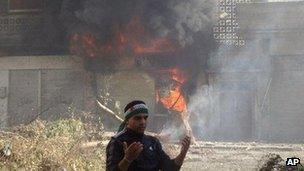Syria rejects new Arab League peace mission proposal
- Published

Activists have reported fresh government attacks on districts of Homs
Syria has "categorically rejected" an Arab League resolution calling for a joint Arab-UN peacekeeping mission to end the country's 11-month conflict.
Yusuf Ahmed, Syria's envoy in Cairo, said the plan "reflected the hysteria of these governments".
The EU on Monday backed the Arab League's "bold" plan but Russia said violence must end before any peacekeepers could be sent.
Meanwhile the UN General Assembly has started a debate on the Syrian crisis.
UN human rights chief Navi Pillay, who has been sharply critical of the actions of President Bashar al-Assad's government, is later set to address the assembly in New York.
The Arab League said it was ending all diplomatic co-operation with Syria, and promised to give "political and material support" to the opposition.
The League's moves come a week after Russia and China vetoed a UN Security Council resolution on Syria, which would have endorsed a previous Arab League peace initiative.
'Clarification'
The EU backed the League's peacekeeping plan on Monday.
Michael Mann, spokesman for EU foreign policy chief Catherine Ashton, said: "We welcome these bold decisions and the strong and clear commitment and leadership that the Arab League is taking to resolve the crisis in Syria.
"The EU's first goal is an immediate cessation of killings and therefore we are very supportive of any initiative that can help achieve this objective, including a stronger Arab presence on the ground in co-operation with the UN to achieve a ceasefire and the end of violence."
He added: "We renew our urgent calls on all members of the Security Council to be constructive and act with responsibility at this crucial moment."
Russia said on Monday that it was studying the plan but that it needed "clarification".
Foreign Minister Sergei Lavrov said there had to be ceasefire in place before any peacekeepers could be sent.
"But the problem is that the armed groups that are fighting the Syrian regime do not answer to anyone and are not controlled by anyone," he said.
China, meanwhile, said Syria's problems needed to be resolved by diplomatic means.
Foreign ministry spokesman Liu Weimin said: "China hopes all relevant parties can keep dialogue and communication to play a positive and constructive role in politically resolving the Syrian issue and easing the country's tension."
Speaking while on a visit to South Africa, UK Foreign Secretary William Hague said: "I don't see the way forward in Syria as being Western boots on the ground, in any form, including in peacekeeping form, but of course if such a concept could be made viable we will be supporting it in all the usual ways."
The BBC's Jeremy Bowen in Cairo says the new Arab League resolution contains its toughest language on Syria so far and makes it much more likely that the issue will return to the Security Council.
The fact that it is considering these moves shows the extent of the Syrian regime's isolation, our correspondent adds.
He says it remains to be seen whether Moscow will continue to lend its support to its old allies and trading partners.
The League's resolution also formally ends the observer mission it sent to Syria in December. It was suspended in January amid criticism that it was ineffective in the face of continuing violence.
The head of that mission, the controversial Sudanese General Mohammed al-Dabi, had submitted his resignation on Sunday.
Earlier, al-Qaeda leader Ayman al-Zawahiri backed the Syrian uprising in a video message, telling the opposition not to rely on the West or Arab countries for support.
There have been reports that US officials suspect al-Qaeda involvement in two deadly blasts in the second city of Aleppo last week.
Meanwhile, fresh violence in the Syrian city of Homs was reported on Monday.
"Tank shelling has been non-stop on Baba Amr and the bombardment on al-Waer [district] began overnight," activist Mohammad al-Hassan told Reuters.
Activists say more than 400 people have been killed since security forces launched an assault on opposition-held areas on the city this month.
Human rights groups say more than 7,000 have died throughout Syria since last March. The government says at least 2,000 members of the security forces have been killed combating "armed gangs and terrorists".
Syria restricts access to foreign media and it is not possible to verify casualty figures.